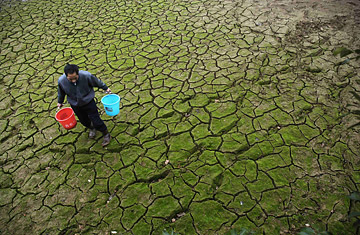
A farmer carries pails to transport water from a partially dried-up pond at the outskirts of Yingtan, Jiangxi province
Olympic glory aside, 2008 will be remembered in China as a year of massive natural disasters. Between the crippling ice storms that left millions stranded during the Chinese New Year holiday last January and February and the Sichuan earthquake in May that killed 88,000, catastrophes touched a wide swath of the country and caused nearly $200 billion in damage — more than four times the previous year.
This year isn't getting off to a much better start. On Thursday, the government announced a severe drought emergency across eight central provinces. The dry conditions have hit an important grain-growing region south and west of Beijing at a time when the country is struggling to keep unemployment in check. (See pictures of Olympic highs and lows in Beijing.)
More than 10 million hectares (25 million acres) of wheat, nearly half the country's total winter wheat cropland, are now suffering, the most widespread water shortage since 1951, according to China's Office of State Flood Control and Drought Relief. Beijing has not recorded precipitation since for over four months, the state-run Xinhua news service reported. And across the provinces of Hebei, Henan, Shandong, Anhui, Jiangsu, Shanxi, Shaanxi and Gansu, 4.3 million people and 2 million head of livestock are experiencing water shortages.
The government has budgeted nearly $60 million in relief aid for the drought, but that may not be enough to help the millions of unemployed migrant workers returning home to the region in coming months. An estimated 20 million of the country's 130 million migrant laborers have been thrown out of work due to the global economic crisis. A lack of buying overseas has led to factory closures and layoffs in China's coastal manufacturing regions, and many people are heading back to their homes in the interior. Most came from farming regions, and local governments had hoped that agriculture could absorb some of unemployed returnees. But with fewer crops to harvest, and herd reductions imminent due to water shortages, there will be little need for more hands.
"The drought will no doubt exacerbate rural unemployment, because arable land is what most migrant workers resort to when they lose their jobs in the cities, and now their last option is under what's probably the most severe threat in decades," says Zhang Xinghua, a researcher at the Chinese Academy of Social Sciences' Rural Development Institute. "This will also have an impact on social stability, though it's hard to gauge to what extent yet. But as the overall economy further slows, I think the situation is likely to get worse."
—With reporting by Jessie Jiang
